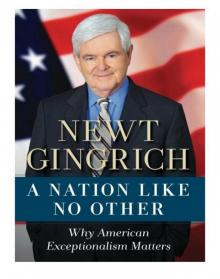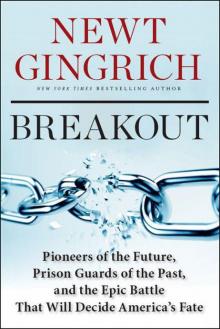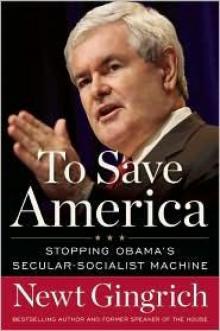- Home
- Newt Gingrich
Understanding Trump Page 15
Understanding Trump Read online
Page 15
Republicans have shifted right, but it’s less extreme than the Democrats’ movement. A plurality of politically engaged Republicans—37 percent—say they are “mostly conservative,” which is one step away from center on Pew’s scale. This much more closely matches the ideological makeup of the Republican Party at large, among whom 32 percent identify themselves as “mostly conservative,” than the corresponding ideological groups in the Democratic Party.
The number of “consistently conservative” politically active Republicans remains high, at 34 percent—12 points higher than the percentage of very conservative Republicans in the general population. In 1994, those figures were 23 percent and 13 percent respectively.
It should be expected that politically active participants deviate from the general populace. But while most political Republicans have drifted one step more conservative than GOP members in the public, the political left has left its constituency—and most Americans—in the dust.
The two Americas were most apparent the weekend of President Trump’s inauguration.
On Friday, the day the president was sworn into office, one America that came to Washington was the country that had been forgotten by most politicians—on both sides of the aisle—and regularly overlooked by the major media outlets.
These were the people who have watched for years as the federal government has taken and squandered their tax dollars, and made it harder for them to get trained for careers, run their businesses, and earn decent livings.
Donning their red “make America great again” caps, they walked out of their hotels and headed to the Capitol to celebrate the inauguration.
Then the other America showed up—the one that blocked people from entering checkpoints to the Capitol grounds, harassed Trump supporters, set cars on fire, smashed storefronts, and hurled rocks at police.
CNN reported the following day that six police officers were injured and 217 protesters arrested after “ugly street clashes in downtown Washington.”4
On Saturday, the less violent side of that America came. It was made up mostly of people enraged that the Trump-supporting side of America was being paid any attention.
Much of the news media covered the weekend with nothing short of petty vindictiveness. Instead of pointing out how gracefully the supporters at the Capitol handled being confronted with virulent hate and vulgarity from the Left’s protesters (no Trump supporters were arrested) the media decided to focus on how big the crowd was compared with past inaugurations.
And this is something that’s important to keep in perspective: Saturday’s coverage was dominated by the crowd-size nonsense, but the day of the inauguration, police arrested left-wing protestors across the country in Washington, DC; New York; Dallas; Chicago; Portland; Seattle; and elsewhere. In Oregon, the protesters were armed with clubs, setting fire to American flags, and throwing rocks, bottles, and flares at police, according to local news reports.5 Protesters at the University of Washington campus threw bricks at officers.
But according to the Left, it’s the Trump supporters who are hateful, closed-minded, and dangerous.
THE CULTURAL LEFT
While some moderate Democrats will be able to work with President Trump—particularly those in politically divided states—the cultural left will obstruct and attack him at every turn.
I’m not talking about regular partisans. It’s the job of Chuck Schumer, the Senate minority leader, to oppose the Republican president. Nor do I mean the millions of Americans who voted for Hillary Clinton, who are not in any way committed to left-wing principles. Those are people we need to work with. I mean the Elizabeth Warren–Bernie Sanders–Keith Ellison wing of the Democratic Party—those in Pew’s out-of-touch 42 percent “consistently liberal” politically engaged Democrats I mentioned earlier.
The hyper-Left wants to create an America that’s unacceptable to the vast majority of Americans. As was mentioned in previous chapters, they focus on insidiously divisive identity politics, branding all Republicans as racist, and keeping Americans dependent on the government. They want a socialist state wherein government rules and citizens obediently pay for all higher education, health care, and social services. Yet, the hard Left can’t solve anything. The Left has no solutions for Chicago’s violence, West Virginia’s poverty, or disastrous schools in Baltimore. All they can do is yell “racism!” and “sexism!” and hope that holds their coalition together.
Just look at the overall messages from the Women’s March the day after President Trump’s inauguration. The organizers—of whom about fifty organizations were paid by George Soros, according to the New York Times6—advocated for things like additional abortion protections, allowing transgender people to use their restrooms of choice, providing federal labor protections to illegal aliens, and establishing rights for sex workers. These are not mainstream issues. There’s no middle ground here. Either Trump surrenders or Trump wins, but there’s not going to be any zone of compromise.
The truth is, if the Republican Party could shrug off the Left’s brand and engage Latinos, African Americans, Asian Americans, and others, we would build a huge coalition of Americans who favor traditional values. These are Americans who want to work hard, provide for their families, and pursue their own happiness without government intrusion. Frankly, that needs to be one of President Trump’s main goals. If he’s successful, it would be the most important accomplishment he could achieve for the Republican Party as president.
THATCHER, TRUMP, AND THE LOONY LEFT
A week after the inauguration, I wrote a column in the Washington Post comparing President Trump with the former British prime minister Margaret Thatcher.
In that piece, I drew a parallel between the vicious hostility Trump has faced—the young liberal fascists wreaking havoc across the country on Inauguration Day—with the intensely bitter, unhinged actions of the British Labor Party under Thatcher. In Britain, as the Left drifted further away from normal Western society, its members earned the moniker “the Loony Left.”
I got the idea after reading a brilliant book by Claire Berlinski called There Is No Alternative: Why Margaret Thatcher Matters. Berlinski was a graduate student at Oxford when Thatcher was prime minister. Interestingly, she was opposed to Thatcher, but later in life realized that Thatcher’s leadership had been absolutely vital.
Berlinski’s core argument is Thatcher faced two crises in England. The first was the crisis of socialism as an immoral, dictatorial, and dangerous movement.
Thatcher’s response to socialism—which describes what President Trump’s response to the hard Left should be—was to wage moral warfare. Thatcher attacked socialism as immoral, not just wrong or expensive. It’s immoral to steal from one person to give to another. It’s immoral to spend other people’s money. It’s immoral to engage in a philosophy that teaches dependence is better than work ethic.
In my op-ed, I wrote that Trump’s focus on tearing down the Left’s moral legitimacy and removing power from the lobbyist and Washington bureaucratic establishments is in line with Thatcher’s model. Already, he has moved forward on controlling immigration, and accelerating important energy infrastructure—which America’s Loony Left has bitterly opposed.
Negotiating with rational Democrats is one thing, but President Trump cannot allow the extreme views of the American Left to force Republicans to compromise on critical issues. When Prime Minister Thatcher passed away in 2013, Arthur C. Brooks, the president of the American Enterprise Institute, wrote about a time when Thatcher interrupted one of her Tory colleagues who was arguing that the party should move to the middle on several issues in the face of pressure from the English hard Left.7 As Brooks wrote:
She pulled a copy of Hayek’s The Constitution of Liberty from her briefcase and slammed it on the table, exclaiming, “This is what we believe!”
Thatcher was aggressive about rejecting the socialist agenda, and Trump should be also.
This is vital because dependency is remarkably antith
etical to American culture. Our society is based on the work ethic and the notion that you can have big dreams, but then you have to go work to make them happen.
The second crisis that Thatcher faced, according to Berlinski, was an effort by the coal miners’ union to essentially take over the country.
The coal miners’ union believed—much like the US Professional Air Traffic Controllers Organization’s strikers did in 1981—that they could force their will on the government by striking. Specifically, the coal miners thought they could strike and seal off the mines, causing Britain to run out of coal. Thatcher, with the aid of the military and police forces, convinced them they were wrong. She saw the strike as an open assault on representative government. Thatcher made sure the coal miners understood that they couldn’t overrule the Parliament, which represents the will of the people.
Reagan sent the same message to the PATCO strikers. They were certain Reagan would fold to their demands, because it would otherwise end the air traffic control system. I was in Congress and represented both the Hampton Air Traffic Control Center and the Atlanta airport. I told the strikers their strategy might have worked with Jimmy Carter, but it wasn’t going to work for Reagan. They were incredulous. They had their strike, and Reagan replaced them.
President Trump faces an analogous fight with hyper-Left employees throughout the federal government, particularly at the Environmental Protection Agency. Leftist EPA workers who refuse to implement President Trump’s energy agenda should be fired. The next section discusses that further.
Thatcher was so clearly anti-Left, its members hated her from the day she was sworn in. Every element of the British news media, the British intellectual community, and the labor movement attacked her. She was constantly under siege, just like Trump.
THE OLD GUARD
President Trump is a change agent. So naturally, he will be resisted by those who do not want change. Washington’s two biggest proponents of the status quo are old-guard lawmakers—those on both sides of the aisle who have become too comfortable to do anything to significantly change the culture of Congress—and the established bureaucracy.
When dealing with the old guard, President Trump should look out for two phrases when he meets with lawmakers. The first is “You really need to be reasonable, so we can work this out.” President Trump’s greatest asset as our top executive is his ability to negotiate. But he will recognize quickly that people on Capitol Hill don’t negotiate like normal businesspeople—because lawmakers aren’t using their own money. Ninety-nine times out of 100, when a politician says you should be reasonable, they mean you should sell out and come over to their side. The president will need to approach every negotiation with serious, exercisable leverage to keep pressure on Congress to do the right thing, the right way.
The second phrase President Trump should look out for is “We should really do this later.” In Congress, later means never. Lawmakers who use this line are not interested in the bold changes President Trump wants and needs to make. So this will immediately signal to him that they are not serious, and need not be bothered with.
THE FOURTH BRANCH
Breaking through the intransigence of the federal bureaucracy—the unofficial fourth branch of government—is the greatest challenge President Trump will face. Make no doubt about it, large sections of the government Trump is trying to lead are committed to destroying his presidency.
Remember that 95 percent of all donations from the so-called fourth branch went to Clinton. The bias is incredibly clear at the Department of State, where 99 percent of campaign support went to Clinton, and at the Department of Justice, where 97 percent of bureaucrat donations supported her. We cannot expect these people to ever stop fighting President Trump.8
Republican Oklahoma senator James Lankford has warned, “Trump’s EPA Secretary will have 16,000 employees working against him.”9
The State Department has a long record of rejecting and undermining presidential foreign policy. When Truman wanted to recognize the state of Israel, the entire leadership of the State Department opposed him, and the State Department’s employees at the United Nations actively supported a resolution to avoid recognizing Israel. Only President Truman’s disciplined focus on recognition overrode the State Department.
When President Reagan wanted to visit Berlin and say “Mr. Gorbachev, tear down this wall,” the State Department’s censors took it out of his speech twice. Even after Reagan put it back for the third time, the morning of his speech in Berlin, every senior adviser argued for taking it out.
President Trump’s dramatic changes in American foreign policy will almost certainly be undermined, resisted, slow-walked, and sabotaged by the career Foreign Service employees. The novels of C. P. Snow and the two BBC television series Yes Minister and Yes Prime Minister are filled with tales of clever bureaucratic resistance to elected officials’ policies. The problem of career bureaucrats having an illegitimate sense of empowerment to ignore the will of the American people is not new. This group feels so entitled, they developed an acronym describing their relations with presidential administrations: WEBEHWYG (“Wee-beh-wig”). It stands for “We’ll be here when you’re gone.”
Shortly after Trump took office, those who oppose him at the Federal Bureau of Investigation began leaking classified information about ongoing investigations to the press in an effort to discredit the president and halt progress on his agenda.
These leaks resulted in the resignation of Gen. Mike Flynn as national security adviser. That was no accident. Remember that 97 percent of political donations from the Department of Justice’s employees went to Hillary Clinton.
Since then, the FBI has leaked like a sieve, anonymously providing the media with classified investigative materials about Russia’s alleged influence on the election.
Federal employees who oppose Trump across the government—from the Environmental Protection Agency, the Department of Labor, the State Department, and the US National Park Services—began to organize via encrypted communication apps.
As Politico reported in February 2017:
Federal employees worried that President Donald Trump will gut their agencies are creating new email addresses, signing up for encrypted messaging apps and looking for other, protected ways to push back against the new administration’s agenda.
Whether inside the Environmental Protection Agency, within the Foreign Service, on the edges of the Labor Department or beyond, employees are using new technology as well as more old-fashioned approaches—such as private face-to-face meetings—to organize letters, talk strategy, or contact media outlets and other groups to express their dissent.
The news service reported that such employees were mainly using the encryption apps “to discuss what they would do if Trump’s political appointees flout the law or delete valuable scientific data.”
Here’s the sick irony: communication by federal employees discussed via encryption applications can’t be reviewed under the Freedom of Information Act—the hallmark legislation of government transparency.
So in order to discuss what might happen if they potentially witnessed theoretical lawbreaking, these federal employees broke the law.
President Trump shouldn’t expect—or force—federal employees to support him politically, or agree with all of his policies. But he should expect and force them to do their jobs. If they refuse, they should be fired, just as Acting Attorney General Sally Yates was when she instructed Department of Justice employees not to defend President Trump’s temporary travel ban in January 2017.
To be clear, Yates wasn’t fired for disagreeing with the president. The attorney general should advise the president anytime he or she finds legal fault in one of the president’s actions. Yates didn’t do that. She was fired for telling her staff to ignore his orders.
President Trump has initiated targeted cuts to reduce the number of nonessential federal employees whose work does not affect national security or the safety of the country, and I
suspect there will be more firings to come. He has, after all, pledged to shrink the federal workforce.
Of course, the bureaucracy is alarmed. All these people have been untouchable for decades. No doubt, federal employees will continue to leak one-sided, inaccurate, or purely fake stories to the press to make the Trump administration appear disorganized, or make it appear that no president has ever been so aggressive with the civil service.
Ignore them.
For historical perspective, Lincoln fired 1,400 of 1,500 political appointees when he took office.
Without bold, dramatic civil service reform, the Trump agenda will prove impossible to formulate and implement.
THE DANGER OF AN ESTABLISHMENT COUP D’ETAT
By the time this book is published, the news of the day almost certainly will be substantially different. But I suspect that the media, the intelligence community, congressional investigators, and the judicial system will still be focused on an alleged connection between the Trump campaign and Russia.
For your context, I am writing this book in early April 2017. At this point, there is more and more evidence building that suggests a wide array of establishment players are trying to use this investigation to cripple or destroy the Trump administration.
For example, it has just been discovered that President Obama’s National Security Adviser, Susan Rice, may have been using her position to tap the intelligence community for a remarkable amount of information about the Trump transition team. It may also be possible that she was leaking names from the surveillance of foreigners who interacted with the Trump team. The former would be inappropriate and an abuse of power. The latter would be a felony.
Rice has prevaricated about this on television. That would be typical since she took the lead in deceiving the public about the Benghazi attack.

 1945
1945 Collusion
Collusion Trump's America
Trump's America Shakedown
Shakedown A Nation Like No Other
A Nation Like No Other To Try Men's Souls - George Washington 1
To Try Men's Souls - George Washington 1 Pearl Harbor: A Novel of December 8th
Pearl Harbor: A Novel of December 8th Valley Forge: George Washington and the Crucible of Victory
Valley Forge: George Washington and the Crucible of Victory To Save America
To Save America Grant Comes East cw-2
Grant Comes East cw-2 Victory at Yorktown: A Novel
Victory at Yorktown: A Novel Days of Infamy
Days of Infamy The Battle of the Crater: A Novel (George Washington Series)
The Battle of the Crater: A Novel (George Washington Series) Breakout: Pioneers of the Future, Prison Guards of the Past, and the Epic Battle That Will Decide America's Fate
Breakout: Pioneers of the Future, Prison Guards of the Past, and the Epic Battle That Will Decide America's Fate Pearl Harbour and Days of Infamy
Pearl Harbour and Days of Infamy Pearl Harbour - A novel of December 8th
Pearl Harbour - A novel of December 8th Understanding Trump
Understanding Trump To Save America: Abolishing Obama's Socialist State and Restoring Our Unique American Way
To Save America: Abolishing Obama's Socialist State and Restoring Our Unique American Way